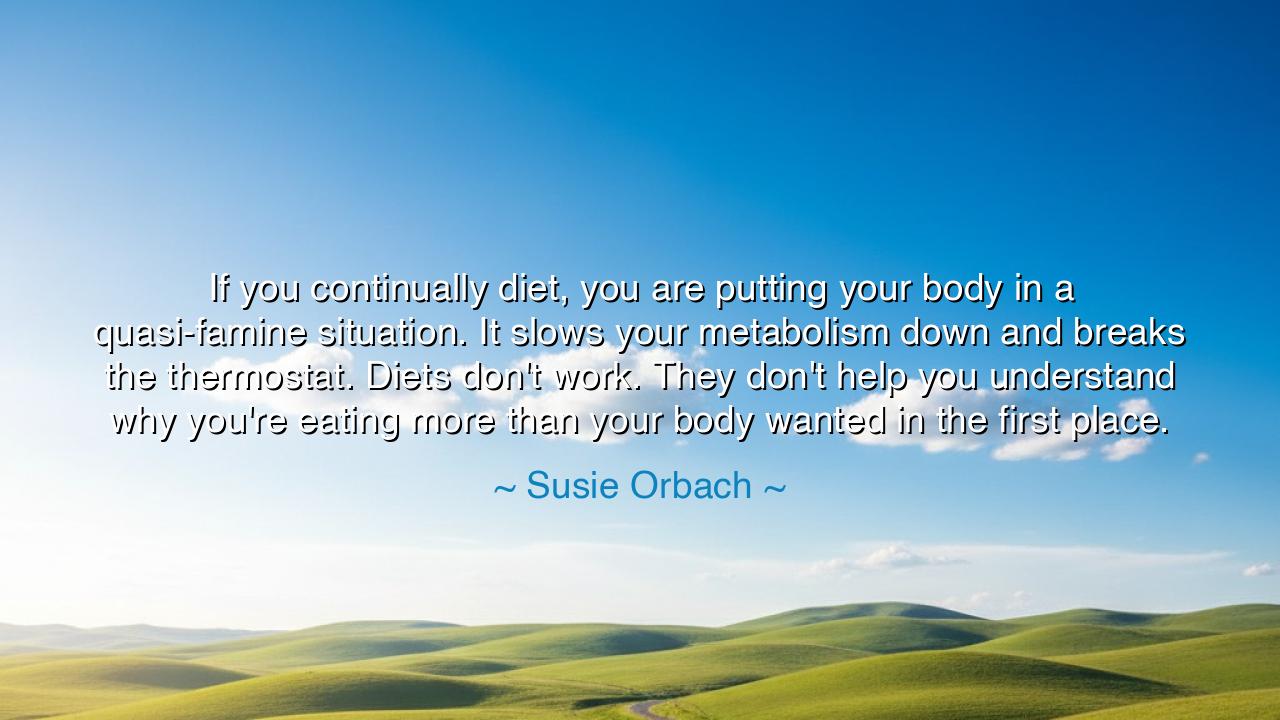
If you continually diet, you are putting your body in a
If you continually diet, you are putting your body in a quasi-famine situation. It slows your metabolism down and breaks the thermostat. Diets don't work. They don't help you understand why you're eating more than your body wanted in the first place.






Listen, O children of the earth, to a wisdom that has echoed through the ages, spoken not just by Susie Orbach, but by those whose lives have been marked by the seeking of balance and understanding. "If you continually diet, you are putting your body in a quasi-famine situation," she says, and in these words lies a truth deeper than the surface. For, as the ancients knew, the balance between hunger and fulfillment is not merely a matter of food, but of spirit, mind, and body. To diet continually is to betray the body’s natural rhythm, to disrupt the sacred harmony between nourishment and need.
The body, O children, is like the great river that winds through the land, its flow governed by forces both seen and unseen. The ancient philosophers, from Hippocrates to Plato, understood that true health arises from balance, not extremes. Diets, in their many forms, are but quick fixes, promises of immediate change that often fail to understand the deeper forces at work within us. Orbach’s words remind us that constant dieting places the body in a state of deprivation, as if it were facing a famine. And when the body is deprived for too long, it responds not with health, but with the shutting down of its natural processes—its metabolism slows, and the thermostat of the body is broken.
In the days of old, King Midas, though blessed with unimaginable wealth, found that his every desire came with a price. His insatiable greed for gold led him to lose sight of what truly nourished him—the simple joys of life. His inability to temper his desires left him empty, for even his food and drink turned to gold, and he could not partake in the life-giving sustenance he once enjoyed. Midas’ folly speaks to the very nature of extreme desires—whether for wealth or for perfection in the body. The more we seek to control or restrict, the more we lose touch with the natural flow of our being, leading to imbalance and suffering.
Susie Orbach’s wisdom extends beyond the physical. She teaches us that dieting does not address the root of the issue. It does not ask the vital question of why we eat more than our body truly desires. In the ancient world, Aristotle taught that true understanding comes from self-reflection, from asking not just "what" but "why." Diets, though they may offer temporary relief, often ignore the deeper emotional and spiritual reasons for overeating. To feed the body without understanding the soul’s hunger is like planting seeds in barren soil—they may grow for a time, but they will not thrive, for they are not nurtured by the deeper wisdom that sustains them.
In the tale of Odysseus, the great Greek hero, we see a man who journeys far and wide, seeking home and wisdom. But it is only when he returns to Ithaca, to his roots, that he truly understands the meaning of his trials. Odysseus learns that the key to true strength lies not in conquering lands, but in understanding oneself. So too must we understand ourselves in the journey toward health. A diet may change the body temporarily, but without understanding the deeper causes of our hunger and desires, it is but a hollow victory. True nourishment comes from listening to the body’s needs and understanding the spirit that resides within it.
Orbach’s call is one of compassion—for the body, for the mind, and for the soul. She speaks not of deprivation, but of restoration, of the need to care for the body without punishing it, to understand its signals without ignoring or overindulging them. A diet that continually forces the body into a state of scarcity is not a path to health but to imbalance, and it is only through balance—through patience, wisdom, and understanding—that we can truly nourish ourselves.
So, O seekers of truth, take heed of this ancient lesson: the path to true health is not found in the extremes of dieting or indulgence. It lies in understanding why we eat, why we hunger, and what we truly need to nourish not just our bodies, but our souls. Feed yourselves with care, with understanding, and with love, and know that the body, when truly cared for, will find its own natural balance. Let the lessons of the ancients guide you, and may you walk the path of wisdom, where nourishment and understanding are the pillars of your strength and vitality.






AAdministratorAdministrator
Welcome, honored guests. Please leave a comment, we will respond soon